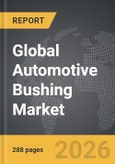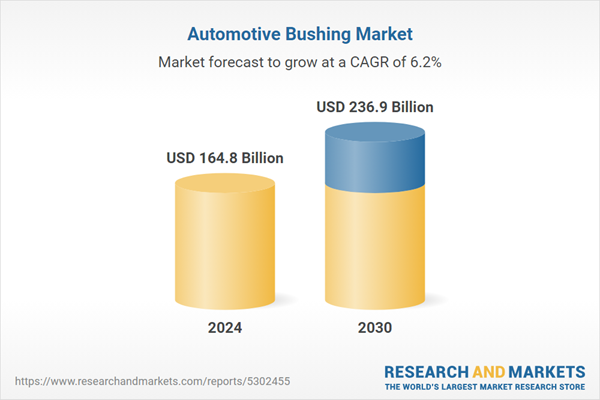Global Automotive Bushing Market - Key Trends and Drivers Summarized
Why Are Automotive Bushings Vital in Modern Vehicle Design?
Automotive bushings, though small and often overlooked, serve as foundational elements in a vehicle's suspension, steering, and structural systems, playing a crucial role in ensuring ride quality and vehicle durability. But what precisely do bushings do, and why are they indispensable in automotive engineering? Essentially, bushings are flexible components, typically crafted from rubber, polyurethane, or composite materials, that cushion and reduce friction between metal parts. Positioned at critical junctions within a vehicle - such as control arms, stabilizer bars, shock absorbers, and subframes - bushings absorb road shocks, dampen vibrations, and isolate noise, contributing to a smoother, more comfortable driving experience. By mitigating metal-to-metal contact, they prevent premature wear and tear on more expensive and intricate components. This isolation effect becomes even more important in modern vehicles, where advanced suspension systems demand high-performance bushings to balance comfort, handling, and durability. With drivers expecting a refined, quiet ride and manufacturers focused on meeting these demands, automotive bushings play an indispensable role in enhancing both the driving experience and the lifespan of various vehicle components.How Are Material Innovations Enhancing Automotive Bushings?
The evolution of automotive bushings has been marked by significant advancements in materials science, allowing engineers to develop bushings that not only last longer but also perform optimally under a wide range of conditions. Traditionally, bushings were made of rubber, which is valued for its ability to absorb shocks and dampen vibrations effectively; however, rubber alone has limitations, particularly in terms of temperature resistance and durability under high-stress conditions. Modern automotive bushings often incorporate advanced materials like polyurethane, which offers superior resilience, temperature stability, and resistance to degradation over time, making them particularly suited for performance vehicles and heavy-duty applications. For high-end or performance vehicles, advanced elastomers have been developed to provide enhanced vibration dampening and noise reduction, catering to consumers who seek both durability and comfort. Additionally, innovations in self-lubricating materials have emerged, reducing the need for regular maintenance and prolonging the lifespan of the bushings, especially in high-friction environments. These materials innovations have broadened the range of applications for bushings and have enabled automakers to produce vehicles that meet increasingly high standards for performance, comfort, and longevity, underscoring the central role that advanced materials play in the evolution of automotive components.What Are the Key Applications of Automotive Bushings?
Automotive bushings are utilized extensively across various vehicle systems, especially in applications where components pivot, bear weight, or move frequently. In suspension systems, bushings are essential for connecting control arms, stabilizer bars, and shock absorbers to the vehicle's chassis, reducing vibrations and minimizing the transmission of noise from the road to the cabin. This noise, vibration, and harshness (NVH) reduction is critical for passenger comfort and overall ride quality, as it isolates passengers from the jolts and vibrations of the road. In steering systems, bushings enable smoother and more precise handling by reducing friction at pivotal joints, which is essential for both stability and maneuverability. Additionally, engine and transmission mounts use specialized bushings designed to withstand high levels of heat and vibration, isolating the engine's vibrations from the vehicle's cabin and ensuring a quieter and more comfortable ride for passengers. Automotive bushings are also essential in electric vehicles (EVs) and high-performance vehicles, where they support vehicle stability and handling, compensating for the unique dynamics associated with high-power electric motors and advanced powertrain designs. This wide range of applications reflects the versatility of bushings and their impact on vehicle performance, comfort, and durability, as they directly contribute to the foundational characteristics of the vehicle.What Drives the Growth in the Automotive Bushings Market?
The growth in the automotive bushing market is driven by a variety of factors, primarily influenced by technological advancements, evolving vehicle designs, and shifting consumer expectations. As the automotive industry pivots toward electric and hybrid vehicles, there is an increased need for bushings that can manage the unique NVH profiles associated with electric drivetrains, which operate differently from traditional internal combustion engines and introduce new vibrational and acoustical challenges. Additionally, the rise of advanced driver-assistance systems (ADAS) and autonomous vehicles has resulted in more complex suspension and steering systems, which rely on high-performance bushings to maintain stability, control, and safety. Innovations in material science, including the development of high-durability elastomers and self-lubricating materials, have expanded the lifespan and functionality of bushings, allowing them to meet the demands of modern vehicle designs that prioritize efficiency and longevity. Moreover, regulatory pressures, especially in regions like the European Union, are pushing automakers to reduce vehicle noise and emissions, necessitating the use of bushings that enhance noise isolation and minimize NVH levels. At the same time, consumers are increasingly expecting vehicles that offer a smoother, quieter ride, compelling manufacturers to invest in quality suspension components, including bushings, to meet these comfort and performance standards. These combined factors highlight the essential role that bushings play in the automotive industry, pointing toward continued growth as vehicle designs become more sophisticated and consumer expectations for quality continue to rise.Report Scope
The report analyzes the Automotive Bushing market, presented in terms of market value (US$ Thousand). The analysis covers the key segments and geographic regions outlined below.- Segments: Application (Suspension, Engine, Chassis, Interior, Exhaust, Transmission); End-Use (Passenger Cars, Light Commercial Vehicles, Heavy Commercial Vehicles).
- Geographic Regions/Countries:World; United States; Canada; Japan; China; Europe (France; Germany; Italy; United Kingdom; Spain; Russia; and Rest of Europe); Asia-Pacific (Australia; India; South Korea; and Rest of Asia-Pacific); Latin America (Argentina; Brazil; Mexico; and Rest of Latin America); Middle East (Iran; Israel; Saudi Arabia; United Arab Emirates; and Rest of Middle East); and Africa.
Key Insights:
- Market Growth: Understand the significant growth trajectory of the Suspension Application segment, which is expected to reach US$79.1 Billion by 2030 with a CAGR of a 6.8%. The Engine Application segment is also set to grow at 6% CAGR over the analysis period.
Why You Should Buy This Report:
- Detailed Market Analysis: Access a thorough analysis of the Global Automotive Bushing Market, covering all major geographic regions and market segments.
- Competitive Insights: Get an overview of the competitive landscape, including the market presence of major players across different geographies.
- Future Trends and Drivers: Understand the key trends and drivers shaping the future of the Global Automotive Bushing Market.
- Actionable Insights: Benefit from actionable insights that can help you identify new revenue opportunities and make strategic business decisions.
Key Questions Answered:
- How is the Global Automotive Bushing Market expected to evolve by 2030?
- What are the main drivers and restraints affecting the market?
- Which market segments will grow the most over the forecast period?
- How will market shares for different regions and segments change by 2030?
- Who are the leading players in the market, and what are their prospects?
Report Features:
- Comprehensive Market Data: Independent analysis of annual sales and market forecasts in US$ Million from 2024 to 2030.
- In-Depth Regional Analysis: Detailed insights into key markets, including the U.S., China, Japan, Canada, Europe, Asia-Pacific, Latin America, Middle East, and Africa.
- Company Profiles: Coverage of players such as Benara Udyog Limited, Boge Rubber & Plastics, Continental AG, Cooper Standard Holdings Inc., Dupont and more.
- Complimentary Updates: Receive free report updates for one year to keep you informed of the latest market developments.
Some of the 42 companies featured in this Automotive Bushing market report include:
- Benara Udyog Limited
- Boge Rubber & Plastics
- Continental AG
- Cooper Standard Holdings Inc.
- Dupont
- Federal-Mogul
- Hyundai Polytech India Pvt Ltd.
- Mahle GmbH
- Nolathane
- Oiles Corporation
This edition integrates the latest global trade and economic shifts into comprehensive market analysis. Key updates include:
- Tariff and Trade Impact: Insights into global tariff negotiations across 180+ countries, with analysis of supply chain turbulence, sourcing disruptions, and geographic realignment. Special focus on 2025 as a pivotal year for trade tensions, including updated perspectives on the Trump-era tariffs.
- Adjusted Forecasts and Analytics: Revised global and regional market forecasts through 2030, incorporating tariff effects, economic uncertainty, and structural changes in globalization. Includes historical analysis from 2015 to 2023.
- Strategic Market Dynamics: Evaluation of revised market prospects, regional outlooks, and key economic indicators such as population and urbanization trends.
- Innovation & Technology Trends: Latest developments in product and process innovation, emerging technologies, and key industry drivers shaping the competitive landscape.
- Competitive Intelligence: Updated global market share estimates for 2025, competitive positioning of major players (Strong/Active/Niche/Trivial), and refined focus on leading global brands and core players.
- Expert Insight & Commentary: Strategic analysis from economists, trade experts, and domain specialists to contextualize market shifts and identify emerging opportunities.
Table of Contents
Companies Mentioned (Partial List)
A selection of companies mentioned in this report includes, but is not limited to:
- Benara Udyog Limited
- Boge Rubber & Plastics
- Continental AG
- Cooper Standard Holdings Inc.
- Dupont
- Federal-Mogul
- Hyundai Polytech India Pvt Ltd.
- Mahle GmbH
- Nolathane
- Oiles Corporation
Table Information
| Report Attribute | Details |
|---|---|
| No. of Pages | 288 |
| Published | February 2026 |
| Forecast Period | 2024 - 2030 |
| Estimated Market Value ( USD | $ 164.8 Billion |
| Forecasted Market Value ( USD | $ 236.9 Billion |
| Compound Annual Growth Rate | 6.2% |
| Regions Covered | Global |









